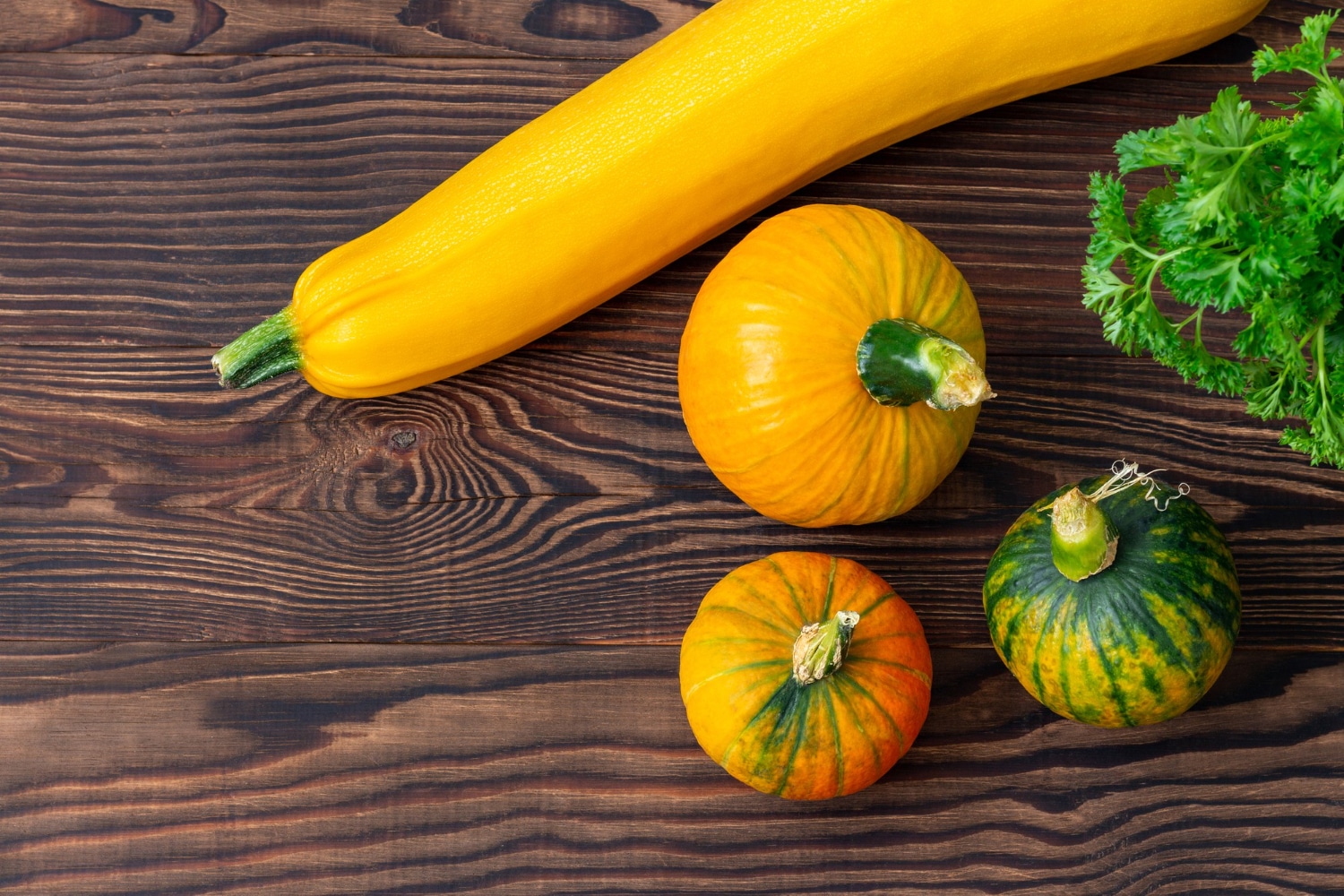Squash vegetable resembles both pumpkin and zucchini but is neither pumpkin nor zucchini. Although all three vegetables belong to the same botanical family and may look similar, they are different in taste. Chefs use them in variant recipes. Zucchini and Pumpkins are both in a sub-category of squash but squash vegetable is a broader term.
Squash vegetables are famous for their use in different culinary recipes. Chefs use them for their unique colour palates and distinctive tastes. They are not only vibrant in colours and yummy in taste but also have many health benefits. Today, our article revolves around squash vegetable types and the benefits of squash vegetables.
Types of Squash Vegetables
There are different varieties of squash vegetables but they can be mainly divided into 4 main types. Summer Squash, winter squash, Pumpkin and speciality squash.
- Summer squash is harvested in summer and usually has very tender skin. They are mild in terms of flavour and have soft seeds and tender texture. They are good to be used in salads, soups and stir-fries. Zucchini, yellow squash, and pattypan squash are summer squashes.
- Winter squashes have a sweet flavour and very thick skin. They are harvested in winter and last longer than summer squashes. Chefs use them in roasting, baking or in purees and also as side dishes and in pies. Butternut squash, acorn squash, spaghetti squash, pumpkin, kabocha squash and delicata squash are winter squashes.
- Pumpkin is a common type of squash used in baking, roasting and cooking. Pumpkins have a sweetish-dense flavour and are mostly used in pies and breads. Chefs also use them in curries and soups.
- There are lots of other varieties of squashes that are different in colours and tastes. They are used in speciality dishes according to their colours and flavours. Kabocha squash (Japanese pumpkin), delicata squash, hubbard squash, turban squash, and buttercup squash are all speciality squashes.

10 Health Benefits Of Squash Vegetable
Squashes have a very high nutritional profile and offer lots of health benefits. Being vegetables they are low in calories but are loaded with minerals, vitamins and folate. Here are a few health benefits of squash vegetables
Nutritional Profile Of Squash Vegetable
Squashes contain Vitamins A, C, B, and E as well as potassium and manganese. Their nutritional profile makes them an excellent choice for those who want to eat tasty and healthy.
Squashes are packed with antioxidants which reduce your cell-aging and improve vision and skin health. Lutein and zeaxanthin are antioxidants in squashes that significantly reduce the risks of eye cataracts and muscle degeneration. Beta-carotene in squashes helps improve your immune function and skin health.
Heart Friendly Vegetable
Squash is rich in potassium which reduces the risk of strokes and heart diseases. It regulates blood pressure and keeps health in check. People with heart conditions can use squashes in their menus to stay healthy.
Aids In Digestion
Squash is loaded with fibres and fibres help regulate gut health. The use of squash in food nourishes good gut bacteria that keep the gut healthy and prevent constipation by making bowel movements regular.
Squash Vegetable For Weight management
Squash vegetables are very fulfilling. Its high fibre and low-calorie content plus its fulfilling quality makes it an excellent choice for those who want to reduce weight.
Improve Immune System
Vitamin C is a known ingredient to support immune health and squash has lots of vitamin C. They also improve your breathing problems by reducing respiratory infections. Moreover, the presence of vitamin C and beta-carotene also protects against certain cancers.

Sugar Control
Squash is a very healthy vegetable with a very low glycemic index. It doesn’t raise your blood sugar instantly which makes it a good choice for people who have diabetes or insulin resistance.
Squash Vegetable For Bone Health
Minerals like potassium and magnesium, are very important for bone health. They make bones dense and strong. So using Squash in meals can decrease the risk of a very common bone denigration disease, osteoporosis.
Good For Hydration
Squash has a high water content and is full of electrolytes. They keep hydration levels in check, regulate body temperature, transport nutrients, and remove waste from cells.
Squash Vegetables Benefits For Skin
Vitamin A and Vitamin C in squash produce collagen which is good for cell regeneration, improving skin elasticity and reducing oxidative stress. So Squash keeps you young and beautiful.
Mental Health Benefits
Nutrients like folate and vitamin B6 in squash play a role in neurotransmitter synthesis and mood regulation. So squash is good for mood uplift, reduces depression and improves mental health.
Is Squash Vegetable A Carbohydrate Or Protein?
Though there are proteins in squash, it is mainly a carb-rich veggie. As the fibre content is high and the vegetable has a low glycemic index, it slows down the absorption of carbs in the bloodstream. so your blood sugar stays normal and you get that “carb effect” on your body.
Are There Any Side Effects Of Squash Vegetables?

Squash is a healthy vegetable but some people may not consume it.
- Squash is from the Cucurbitaceae family so certain people may be allergic to it. Allergic reactions are rare but can include hives, swelling and irritation.
- Fibre is good for bowel regulation but in some people, it can lead to gas, bloating and diarrhoea.
- Some varieties of winter squash are rich in oxalate. Oxalates can produce kidney stones.
All these above risks are rare but can happen. Overall, squash is a healthy vegetable and recommended for all unless your medical supervisor advises you to avoid it.


